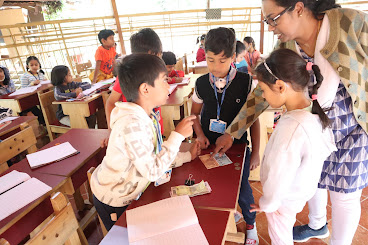Role Model Conflict - RMC
Role Model Conflict - RMC
- Dr. Ajit Sabnis
RMC is a common phenomenon among school going children.
Analytical capabilities are not yet fully developed among children (Age group 5 to 10).
Most children of this age group spend their active time in school.
They observe, they assimilate and interpret what they understand.
At school, they generally identify themselves with a particular teacher who makes them very comfortable and subconsciously, he/she becomes their role model. This role model now becomes their baseline personality for measuring other influences. Be it a teaching methodology or solving a maths problem or mannerisms or behavior.
Now, the scenario changes to Home, when the child returns from school after school hours.
At home, the child generally sees his/her role model either in a father or mother. Whatever they do also is right for them.
So the Child now has two role models- One at School and one at home.
Who is Right? Whom to follow? This is the conflict.
Let me say this with an example. Most of us as parents have faced this. Maths Homework. Child fails to solve a problem and parents help the child. Father or Mother teaches the child how to solve and get the right answer. But, the method taught by the teacher is different from what the parent teaches. There is a conflict in child's mind. Who is right? The child surely going to say, the answer is right but this is not the way teacher has solved this problem. Child fails to understand the conflict. They do express their non acceptance in several ways.
One of the first grade student kissed a girl student in a class. When inquired, the boy told the teacher that his father would do the same with his mother at home. This would tell you the influence of a role model. On the other hand, we also have several examples of children displaying extraordinary life values based on the role model influence.
As primary stakeholder in your child's education, you need to resolve this issue at the earliest.
Constant interaction with the teachers of your child in early ages becomes all the more important.
Try understanding the child's role model in school and talk to him/her. You will understand your child better.
See you soon.
- Dr. Ajit Sabnis
Analytical capabilities are not yet fully developed among children (Age group 5 to 10).
Most children of this age group spend their active time in school.
They observe, they assimilate and interpret what they understand.
At school, they generally identify themselves with a particular teacher who makes them very comfortable and subconsciously, he/she becomes their role model. This role model now becomes their baseline personality for measuring other influences. Be it a teaching methodology or solving a maths problem or mannerisms or behavior.
Now, the scenario changes to Home, when the child returns from school after school hours.
At home, the child generally sees his/her role model either in a father or mother. Whatever they do also is right for them.
So the Child now has two role models- One at School and one at home.
Who is Right? Whom to follow? This is the conflict.
Let me say this with an example. Most of us as parents have faced this. Maths Homework. Child fails to solve a problem and parents help the child. Father or Mother teaches the child how to solve and get the right answer. But, the method taught by the teacher is different from what the parent teaches. There is a conflict in child's mind. Who is right? The child surely going to say, the answer is right but this is not the way teacher has solved this problem. Child fails to understand the conflict. They do express their non acceptance in several ways.
One of the first grade student kissed a girl student in a class. When inquired, the boy told the teacher that his father would do the same with his mother at home. This would tell you the influence of a role model. On the other hand, we also have several examples of children displaying extraordinary life values based on the role model influence.
As primary stakeholder in your child's education, you need to resolve this issue at the earliest.
Constant interaction with the teachers of your child in early ages becomes all the more important.
Try understanding the child's role model in school and talk to him/her. You will understand your child better.
See you soon.




Comments
Post a Comment